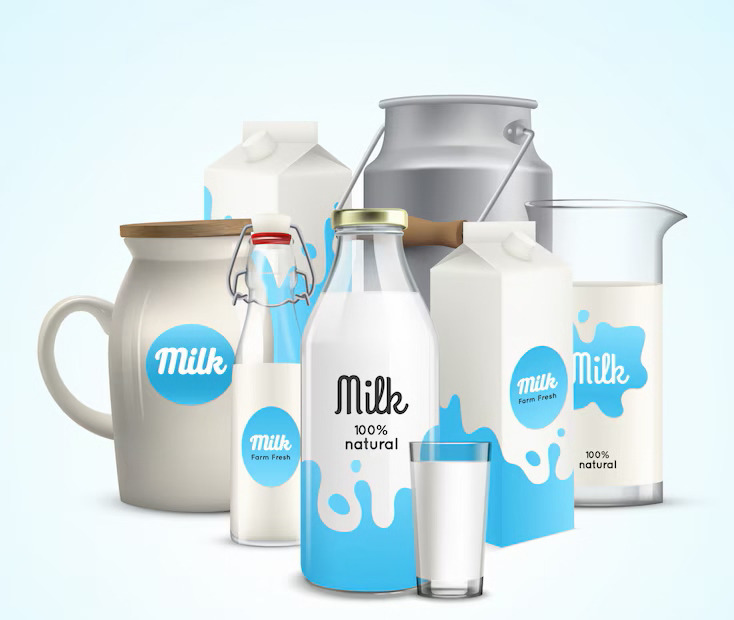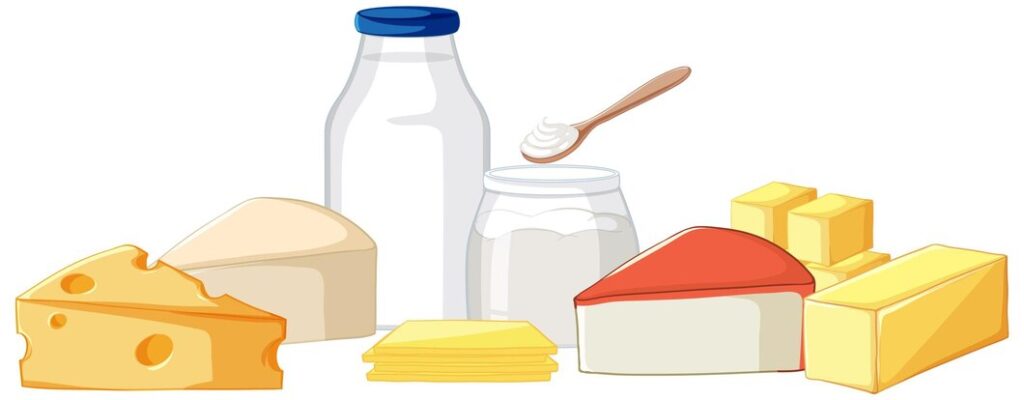GST On Milk, Paneer, Curd And Dairy Related Products
- 17 Aug 24
- 12 mins

GST On Milk, Paneer, Curd And Dairy Related Products
Key Takeaways
- Fresh milk of all types is exempt from GST to maintain affordability and accessibility.
- Branded paneer attracts a 5% GST, while unbranded paneer is exempt.
- Businesses manufacturing taxable dairy products can claim GST credits on their input costs.
- Imported dairy products are subjected to the same GST rates as domestic products, plus potential additional import duties.
- There have been no recent changes to the GST rates applied to basic dairy products like milk, curd, and paneer.
Goods and Services Tax (GST), implemented in India in 2017, revolutionized the tax framework, unifying multiple indirect taxes. Dairy products, staples in Indian diets, were significantly impacted. Understanding GST's application to milk, curd, and packets of paneer helps consumers and businesses alike navigate tax liabilities efficiently.
GST Applicability on Dairy Products
In the context of India's Goods and Services Tax (GST) system, dairy products such as milk, curd, and paneer receive varying treatments based on their processing and branding, reflecting the government's approach to balancing revenue generation with affordability and access to basic food products.

GST Applicability on the Production and Sale of Milk
Milk, one of the most essential dietary staples, is treated favorably under GST. Fresh milk, regardless of whether it is from cows, buffaloes, goats, or any other animals, or whether it's packed milk or loose, is exempt from GST. This exemption is strategic, aimed at ensuring that the dairy segment remains affordable for all segments of the population. The government recognizes milk as a fundamental nutritional product and has thus decided not to burden consumers with additional tax costs.
GST Applicability on the Production and Sale of Curd
Curd, another important dairy product derived from milk, also enjoys a GST exemption when it is sold unbranded. This aligns with the treatment of fresh milk, ensuring that basic dairy products used daily by a vast majority of Indian households remain affordable. The exemption of curd from GST helps maintain low consumer prices for dairy products, supporting widespread consumption and dietary inclusion, which is particularly important in a country where vegetarian diets are prevalent.
GST Applicability on the Production and Sale of Paneer
Paneer, widely consumed in various traditional Indian dishes, is treated similarly to milk and curd, with one key difference pertaining to branding. Loose paneer is exempt from GST, allowing it to be accessible at lower prices.
However, once paneer is branded and sold under a registered trademark or brand name, it attracts a 5% GST rate. This tax imposition on branded paneer aims to collect revenue from higher-end products without impacting the affordability of unbranded and therefore typically less expensive, versions of the same product.
GST Rates and HSN Codes on Dairy Products
The various rates and the corresponding Harmonized System of Nomenclature (HSN) codes is crucial for compliance and proper tax management within the dairy industry. Here’s a detailed overview focusing on the GST rates and HSN codes for key dairy products like pasteurized milk, milk powder, and other dairy derivatives.
- Pasteurised Milk
Pasteurized milk, which is milk that has been heat-treated to kill harmful bacteria, typically falls under the GST exempt category when it is sold unbranded. This exemption aims to make essential dairy products more accessible and affordable to the general public.
- HSN Code: 0401
- GST Rate: 0% for unbranded, 5% for branded
- Milk Powder
Milk powder is another essential dairy product that is used both domestically and industrially. It carries a GST due to its processed nature.
- HSN Code: 0402
- GST Rate: 5%
- Condensed Milk
Condensed milk, both sweetened and unsweetened, is subject to GST. Given its use in various culinary preparations, it is classified as a more processed dairy product.
- HSN Code: 0402 (same as milk powder due to similar processing levels)
- GST Rate: 12%
- Natural Milk Constituents (such as Cream, Skimmed Milk, and Butter Oil)
Natural milk constituents are products derived from milk through processes that either remove water or separate fat from milk. These include items like cream, skimmed milk, and butter oil.
- HSN Codes:
- Cream: 0401
- Skimmed Milk: 0402
- Butter Oil: 0405
- GST Rate: Generally 5%, varies depending on the branding and packaging
- Cheese and Curd
Both types of cheese and curd are popular dairy products with specific GST implications depending on their branding.
- HSN Code for Cheese: 0406
- HSN Code for Curd: 0403
- GST Rate: 0% for unbranded, 5% for branded
- Butter and Ghee (Clarified Butter)
Butter and ghee are essential fats derived from milk. They are taxed irrespective of branding, given their widespread use in cooking and at industrial levels.
- HSN Code: 0405
- GST Rate: 12%
- Flavoured Milk and Other Dairy Beverages
Flavoured milk and dairy-based beverages are considered value-added products and thus attract a GST.
HSN Code: 2202 (for beverages, including those containing dairy)
GST Rate: 12%
How GST is calculated on dairy products?

Calculating GST (Goods and Services Tax) on dairy products, particularly those like milk food, involves understanding the product's specific classification under the GST framework, the incorporation of any additional ingredients like sweetening matter, and the final packaged form of the product.
Here's an overview of how GST is typically calculated on milk food and related products.
- GST Calculation on Milk Food
Milk Food generally refers to dairy-based products that are meant for consumption in forms other than liquid milk, such as infant formulas, dairy whiteners, and other fortified dairy products. The GST rate and calculation for milk food can vary based on its composition and branding.
GST Rate: Typically, milk food attracts a GST of 5%. This rate applies if the product is not significantly sweetened or flavored. If additional ingredients, such as sweeteners or flavorings, are added, the product might fall into a different GST category.
- Additional Considerations for GST on Milk Food
Inclusion of Sweetening Matter: If milk food products include sweetening matter or are sold as flavored varieties, they may be subject to higher GST rates, potentially up to 18%. This is because these additives transform the product into a more processed food item, which is taxed at a higher rate under GST regulations.
- GST Calculation on Other Dairy Products
Natural Milk Constituents: Products such as cream, butterfat, and skimmed milk powder are typically taxed at 5%. These are considered essential dairy derivatives and are taxed at a moderate rate to encourage their use in further food processing.
Condensed Milk: This product is more processed and is usually sweetened, falling under a GST rate of 12%.
Ultra High Temperature (UHT) Milk: This long-life milk that has been treated at high temperatures to kill bacteria typically attracts a GST of 5%.
How to claim GST credit on dairy products?
Claiming GST credit on dairy products, particularly those originating from animals, is a crucial aspect for businesses in the dairy sector to manage costs and optimize tax efficiency. Below is a detailed guide on how businesses involved in the production, processing, and sale of products of animal-origin can claim GST credit.
What is input tax credit (ITC) for dairy products?
Input Tax Credit (ITC) refers to the credit a business can claim for the GST paid on purchases related to the cost of production of goods or services that are later sold. For dairy products, this involves GST paid on raw materials, processing equipment, packaging, and other inputs.
Eligibility for Claiming GST Credit
Registration: Businesses must be registered under GST to claim ITC.
Taxable Supplies: Only GST paid on goods or services used to make taxable supplies (including zero-rated supplies) is eligible for credit.
Documentation: Proper invoices from GST-registered suppliers are necessary. These invoices should detail the GST charged.
Step-by-Step Process to Claim GST Credit on Dairy Products
Step 1: Ensure Proper Documentation
Businesses should maintain tax invoices, debit notes, and receipts for all purchases related to dairy products. These documents must include:
- Supplier's GSTIN
- Description of goods or services
- Amount of GST charged
Step 2: Use GST for Business Purposes
GST credit can only be claimed on goods and services used for business purposes. For example, GST paid on milk processing equipment or packaging for milk products is creditable.
Step 3: File Timely GST Returns
To claim ITC, businesses must file regular GST returns. The details of purchases and the corresponding GST paid must be included in these returns.
Step 4: Reconciliation
It is important to regularly reconcile purchase records with the GST credits claimed in returns to make sure that all ITC claims are accurate and supported by legitimate invoices.
Examples of GST Credit Claims on Dairy Products
- Milk and Milk Products: GST paid on the purchase of feed for dairy animals, milking machines, and storage tanks can be claimed as ITC by producers of milk and milk-derived products like cheese, butter, and buttermilk.
- Packaging Materials: GST paid on the purchase of packaging for dairy products like yogurt, cheese, and paneer is fully creditable if these products are sold in taxable categories.
- Processing Inputs: GST on services like cold storage, transportation of types of milk products under refrigeration, and other logistical services are eligible for ITC.
Special Considerations
- Exempt Supplies: If a dairy product is exempt from GST (e.g., fresh milk), the GST paid on inputs for producing such an item generally cannot be claimed as credit.
- Mixed Supplies: If a business sells both taxable and exempt products, it can only claim ITC proportionally related to the taxable products.
GST Rate Changes on Dairy Products

GST rate changes on dairy products is crucial for producers, distributors, and consumers within the dairy industry. These changes can impact pricing, costs, and overall financial planning. Here, we explore how applicable GST rates have evolved for various dairy products and the implications of these changes.
Overview of GST Rate Changes on Dairy Products
Initial GST Implementation: When GST was first implemented in India, most basic dairy products like milk were exempt to avoid any undue burden on consumers for essential commodities. However, value-added dairy products such as flavored milk, ice cream, and certain cheeses were taxed, reflecting their classification as luxury or non-essential items.
Key GST Rate Changes Over Time
- Fresh Milk and Curd: These products have consistently remained exempt from GST to ensure that basic dietary requirements remain affordable for all sections of society. This exemption includes all types of fresh milk (cow, buffalo, goat, etc.) and plain curd.
- Cheese and Butter: Initially taxed at a standard rate, there have been discussions and proposals to reconsider the GST rate on milk products like cheese and butter to boost domestic production and consumption. As of the latest updates, cheese and butter attract a 12% GST rate.
- Paneer (Cottage Cheese): Unbranded paneer remains exempt from GST, while branded paneer is taxed at 5%. This differential rate strategy aims to support small producers and local dairy farmers who might not brand their products.
- Flavored Milk: Flavored milk, including those with added sugar or other sweetening agents, is subject to a 12% GST rate, which is higher than the rate for basic milk products due to its additional processing and added ingredients.
- Ice Cream and Frozen Desserts: One of the higher taxed dairy products, ice cream, and similar frozen desserts are taxed at 18%. This rate reflects the luxury status of these products within the food category.
Factors Influencing GST Rate Changes
- Economic Policies: Government policies aimed at promoting the dairy sector and increasing farmer incomes can lead to tax incentives or reductions.
- Market Dynamics: Changes in consumer behavior, like increased demand for health-based products, can influence decisions on tax rates.
- Health and Nutritional Considerations: Products that are considered beneficial for public health may receive favorable tax treatment to encourage consumption.
Implications of GST Rate Changes
- For Producers: Understanding these changes is crucial for pricing strategy, cost management, and compliance. Dairy producers need to keep abreast of any tax changes to manage their input costs effectively and price their products competitively.
- For Consumers: GST rate changes can directly affect retail prices, influencing consumer choices and consumption patterns. Consumers benefit from exemptions and lower rates on essential products but may see price increases in luxury or non-essential dairy products due to higher taxes.
- For the Economy: The dairy industry is a significant part of the agricultural sector. Favorable GST rates on essential dairy products support the economy by making nutritional products accessible while using higher rates on luxury items as a revenue source.
Conclusion
GST's implementation has subtly but significantly impacted dairy products, maintaining affordability while ensuring tax compliance. This nuanced approach supports both consumers and producers in the dairy industry.
💡Missing the deadline to pay GST payments? Download Pice and start using a credit card to pay GST on time, experience efficiency and convenience, and manage cash flow more effectively.
 By
By 















